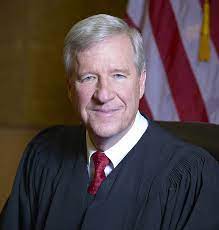“Third Parties” Score Court Victory in Georgia Ballot Access Case brought by Libertarians
 (APN) ATLANTA — “Third party” candidates, or what in Georgia law are called “political body” candidates, scored a major court victory on Monday, March 29, 2021, when U.S. District Court Judge Leigh Martin May ruled in favor of the Georgia Libertarian Party, Libertarian voters, and Libertarian candidates who argued that Georgia’s restrictive laws make it far too difficult for anyone other than Democrats or Republicans to run for U.S. House in Georgia.
(APN) ATLANTA — “Third party” candidates, or what in Georgia law are called “political body” candidates, scored a major court victory on Monday, March 29, 2021, when U.S. District Court Judge Leigh Martin May ruled in favor of the Georgia Libertarian Party, Libertarian voters, and Libertarian candidates who argued that Georgia’s restrictive laws make it far too difficult for anyone other than Democrats or Republicans to run for U.S. House in Georgia.
https://www.courtlistener.com/recap/gov.uscourts.gand.244357/gov.uscourts.gand.244357.159.0.pdf
 Lead plaintiff Martin Cowen has tried several times to run for U.S. House in Georgia’s Thirteenth U.S. Congressional District. The case is Martin Cowen, et al. v. Brad Raffensperger, 1:17-cv-04660-LMM.
Lead plaintiff Martin Cowen has tried several times to run for U.S. House in Georgia’s Thirteenth U.S. Congressional District. The case is Martin Cowen, et al. v. Brad Raffensperger, 1:17-cv-04660-LMM.
“No political-body candidate for U.S. Representative has ever satisfied the requirements to appear on Georgia’s general-election ballot since the 5% petition requirement was adopted in 1943,” Judge May noted in her ruling, finding this to be evidence of an excessive burden.
“The Libertarian Party runs numerous candidates for U.S. Representative and has had those candidates on the ballot in every state in the nation except Georgia,” Judge May noted.
Atlanta Progressive News has been covering the case since it was first filed in 2017, as well as ballot access lawsuits that came before it.
(Dec. 2020 update to case combined with interview with independent, Rep. Stovall)
The case was originally filed in 2017, and Judge May originally ruled against the plaintiffs.
In doing so, Judge May noted that Georgia’s five percent petition requirement for non-statewide races had been upheld in previous cases.
However, the U.S. Court of Appeals for the Eleventh Circuit reversed and remanded the case back to Judge May, finding that Judge May ought to have considered the present circumstances as a whole, in that there were changes in circumstances since the prior rulings were issued.
The Eleventh Circuit ruled that the lower court should conduct a balancing test, balancing the burden on third party candidates with the benefit the government says they derive from making it harder for candidates to get on the ballot.
 Faye Coffield, an aspiring candidate for Georgia’s Fourth U.S. Congressional Candidate, who tried to gain ballot access as an independent candidate in 2008, challenged Georgia’s five percent petition requirement for non-statewide races.
Faye Coffield, an aspiring candidate for Georgia’s Fourth U.S. Congressional Candidate, who tried to gain ballot access as an independent candidate in 2008, challenged Georgia’s five percent petition requirement for non-statewide races.
The Court ruled against Coffield, finding that while she had shown that she had struggled to gather the tens of thousands of petition signatures required to get her name on the ballot as an independent candidate, that she had not provided sufficient evidence of candidates other than herself who had also tried and failed.
http://atlantaprogressivenews.com/2009/06/21/independent-coffield-to-appeal-ballot-access-ruling/
In 2016, a federal judge struck Georgia’s ballot access law for U.S. Presidential candidates (one percent signatures, as a statewide race).
 In the 2016 ruling, U.S. District Court Judge Richard Story replaced Georgia’s one percent signature requirement for minor party candidates for President of the U.S. to gain access to the Georgia ballot, with a temporary requirement of 7,500 signatures until Georgia’s Legislature could pass a new law.
In the 2016 ruling, U.S. District Court Judge Richard Story replaced Georgia’s one percent signature requirement for minor party candidates for President of the U.S. to gain access to the Georgia ballot, with a temporary requirement of 7,500 signatures until Georgia’s Legislature could pass a new law.
However, the Georgia Legislature for five years now has failed to advance ballot access legislation for independent or third party candidates–reflective of the two party monopoly’s tendency to protect its own monopoly.
Therefore, the 7,500 petition signature threshold announced by Judge Story in 2016 has stood for U.S. Presidential races in Georgia.
In the U.S. House candidate case brought by the Georgia Libertarians, Judge May has not yet announced a reduced threshold from the stricken five percent signature rule.
Judge May has asked the parties to propose a suggested remedy, which could reasonably be expected to include a lower signature requirement, as well as a lower qualifying fee amount. Judge May found Georgia’s high qualifying fee to be another barrier to third party candidates.
The ruling may put additional pressure on the Georgia Legislature to pass a new ballot access law, and even to take off the books Georgia’s existing laws that have been stricken by the Courts as applied to races for U.S. House and President of the United States.
 “Your right to run for office is as important to representation as your right to vote,” Libertarian Party of Georgia Chair Ryan Graham said in a statement.
“Your right to run for office is as important to representation as your right to vote,” Libertarian Party of Georgia Chair Ryan Graham said in a statement.
https://lpgeorgia.com/big-win-ga-court-rules-ballot-access-barriers-unconstitutional/
“Candidates should represent their communities and run on ideas, not choose from two outdated parties and their monied interests, who dictate their platforms,” Graham said.
“Republicans and Democrats got power and they shut the door behind them. We’re the third party in line – and we’re tearing down the walls for everyone. More choices on your ballot means more voice in how you’re governed,” Graham said.
(END / Copyright Atlanta Progressive News / 2021)